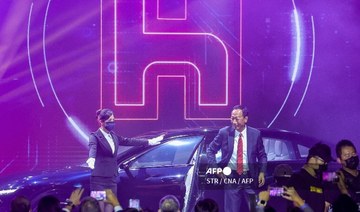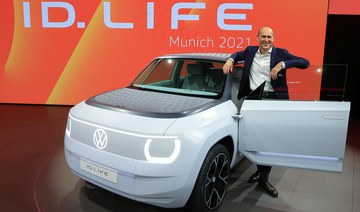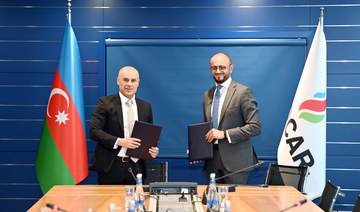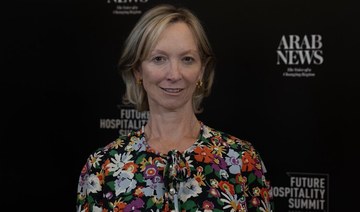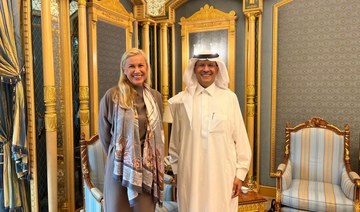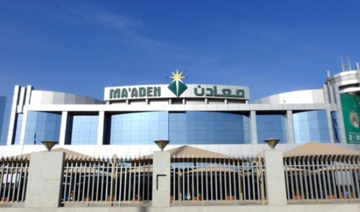LONDON: Nearly one in five vehicles sold in the European Union in the third quarter was an electrified model as sales continued to soar while fossil-fuel cars slumped, according to sales data released on Friday by a trade organization.
The European Automobile Manufacturers’ Association, or ACEA, which represents major European car, truck, van and bus makers, said that battery electric and plug-in hybrid model sales across the European Union made up just under 19 percent of all sales.
Battery electric vehicle sales jumped nearly 57 percent to more than 212,000 units, while plug-in hybrid models rose nearly 43 percent to more than 197,000 units.
This is a slower pace of growth than in 2020 when sales almost trebled from a low base.
But it compares with a 35 percent drop in sales for petrol cars — which still are the biggest sellers and account for nearly 40 percent of overall sales — and a more than 50 percent drop for diesel cars during the quarter.
Less than a decade ago, diesel cars made up more than 50 percent of sale in the EU, but accounted for under 18 percent of all cars sold in the third quarter.
As well as having to meet stringent new EU carbon emissions targets, car makers and consumers have benefited from government subsidies for electric vehicles.
The European Commission has also proposed an effective ban on fossil-fuel vehicles from 2035, aiming to speed up the switch to zero-emission electric vehicles as part of a broad package of measures to combat global warming.
Electrified cars hit almost a fifth of EU Q3 vehicle sales
https://arab.news/gjdw9
Electrified cars hit almost a fifth of EU Q3 vehicle sales
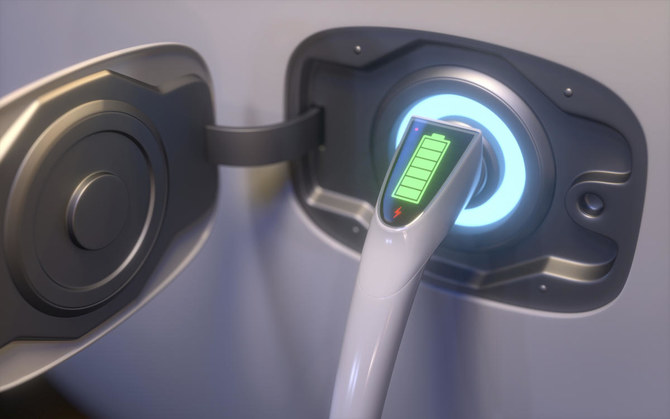
- Battery electric vehicle sales jumped nearly 57 percent to more than 212,000 units
Malaysia to witness $10bn investment from ACWA Power in renewable energy sector: prime minister
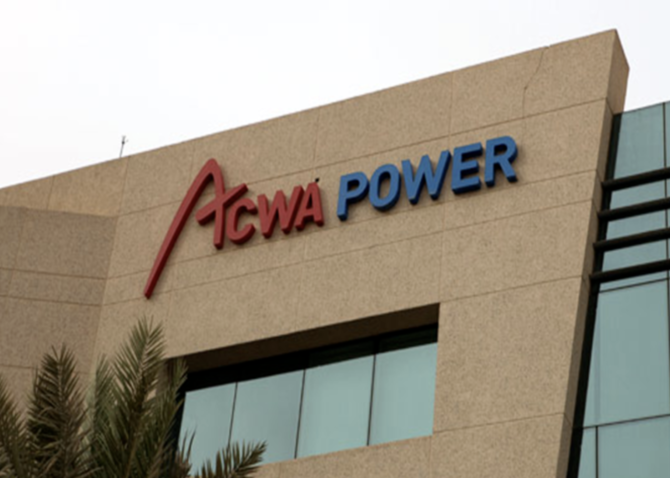
RIYADH: Saudi utility firm ACWA Power has expressed interest in investing $10 billion in Malaysia over the next 10 years to develop renewable energy projects.
According to a report by the Malaysian National News Agency Bernama, ACWA Power will collaborate with Cypark Resources Bhd on the developments.
Malaysian Prime Minister Anwar Ibrahim confirmed this news on his Facebook page following a meeting with ACWA Power Chairman Mohammad Abunayyan on the sidelines of the World Economic Forum in Riyadh.
Ibrahim said that the Saudi firm is prepared to collaborate with strategic partners in Malaysia to develop multiple renewable projects across various states in the nation.
“I express my appreciation for ACWA Power’s commitment to increasing its investments in Malaysia and informing that the country always welcomes any effort that contributes to the economic growth of the country and the prosperity of the people,” Ibrahim wrote on his Facebook page.
He added that ACWA Power has already presented several investment proposals, which include developing renewable sites in Kelantan, Perlis, and Johor, as well as in Terengganu and Sarawak.
The prime minister said Malaysia will continue to implement investment-friendly policies, with a focus on initiatives ensuring that every deal is simplified and expedited.
Earlier this month, ACWA Power signed a new agreement with SOCAR, the state oil company of Azerbaijan, to accelerate the development of renewable projects in the nation.
“The primary directive of the agreement will be to enhance SOCAR’s carbamide fertilizer facility, striving toward more value-added low-carbon products,” said ACWA Power in a statement at that time.
In the same month, the Saudi-listed firm also signed another deal with the International Renewable Energy Agency to accelerate the adoption of clean energy worldwide.
Under the deal, the utility developer will work closely with IRENA to share crucial insights on infrastructure investment in renewable energy, green hydrogen advancement, solar energy, and the intersection of energy and water.
ACWA Power and IRENA will also investigate avenues to mobilize finance and investment for renewable projects, along with supporting infrastructure for the development, storage, distribution, and transmission of clean energy.
Saudi Arabia open to readjusting 150m tourists Vision 2030 target if goal achieved early, official reveals

RIYADH: Saudi Arabia is open to readjusting its goal of attracting 150 million visitors by 2030 if those numbers are achieved ahead of time, according to the deputy minister of destination enablement at the Ministry of Tourism.
Speaking in an interview with Arab News on the sidelines of the first day of the Future Hospitality Summit taking place in Riyadh from April 29 to May 1, Mahmoud Abdulhadi explained that targets are adjusted based on performance.
“As we hit our target seven years ahead of target, our 100 million target, we therefore now have a new target,” Abdulhadi said.
“I’m sure if we were to hit that new target with a significant overperformance in terms of the timeline, our targets would also be adjusted,” he added.
The deputy minister went on to stress that this does not affect the ministry’s plans significantly as the entity works to ensure the sector is sustainable and can grow.
“The fact that we’ve been able to absorb the 100 million tourists in the last year, and we will continue to see growth in that figure, it just means that some of our plans may need to be accelerated, some of them may need to be modified a little bit,” Abdulhadi highlighted.
“But we’ve always been planning to make sure that that sustainability and that growth is embedded in everything that we do,” he affirmed.
The deputy minister clarified that there will be no change in terms of how the entity will deliver. Instead, there may be some modifications regarding its tactical priorities as well as delivery timelines.
Regarding the ministry’s secondary role as the sector’s regulator, Abdulhadi underlined that the organization is working to promote the industry from an investment perspective to create a visitable and sustainable field.
“In order to do this, that enablement means that we are cascading down our national tourism strategy and our national targets onto and through our partners in the government, be they the other ministries, because, as you know, tourism is a very horizontal sector; we cover a lot of of other industries,” he empathized.
Abdulhadi also mentioned that the ministry is working with the regional development authorities to help ensure that they are delivering on the promise made at the national level to conceive these destinations correctly.
“So again, we are the regulator, and we are there to make sure that the environment is in the right place, it is in the right regulations, and it is in the right attractiveness to investors and visitors alike,” the deputy minister said.
“We are definitely working with the private sector to help facilitate for them, where investors come in and they bring in operators. We try and assist both parties on making sure that the product that is delivered meets our ambitions,” he added.
Discussing the pledge to create one million additional jobs in the sector, Abdulhadi explained how the ministry is currently engaging with several international operators and providers of training facilities and education.
“We’ve committed to train over 100,000 Saudis a year, and in order to do this, we’ve teamed up with with the best people globally and domestically in order to deliver on those training programs,” Abdulhadi concluded.
More than 1,200 global investors are expected to partake in FHS. The event, which is being held at Al-Faisaliah Hotel, will focus on sustainable tourism and technology-driven hospitality under the theme, “Invest in Tomorrow: Today, Together.”
Industry leaders are projected to discuss sustainable development, investment prospects, entrepreneurship, and human capital, as well as gain insights into the continued expansion of the Kingdom’s hospitality and tourism sectors.
Saudi Arabia and Mauritania forge energy pact, emphasizing expertise exchange
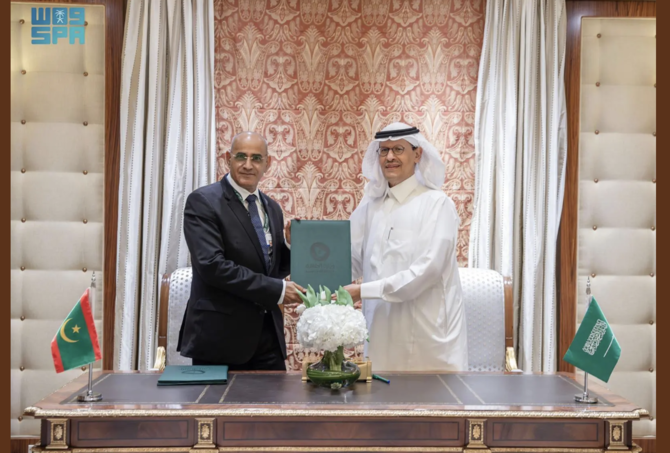
RIYADH: Saudi Arabia and Mauritania have signed a framework agreement aimed at exploring opportunities and fostering expertise exchange in the fields of electricity, renewable energy, and clean hydrogen.
The memorandum of understanding was signed during the recently concluded World Economic Forum Special Meeting in Riyadh, where Saudi Minister of Energy Prince Abdulaziz bin Salman and Mauritania’s Minister of Petroleum, Mines, and Energy, Nany Ould Chrougha, met.
The MoU encompasses promoting the exchange of expertise and exploring partnership opportunities in renewable energy sectors such as solar, wind, waste-to-energy, and geothermal energy, according to the Saudi Press Agency.
Moreover, the deal focuses on enhancing the reliability and security of the electricity system through development and improvement initiatives.
Ma’aden strengthens phosphate business through share purchase agreement with Mosaic
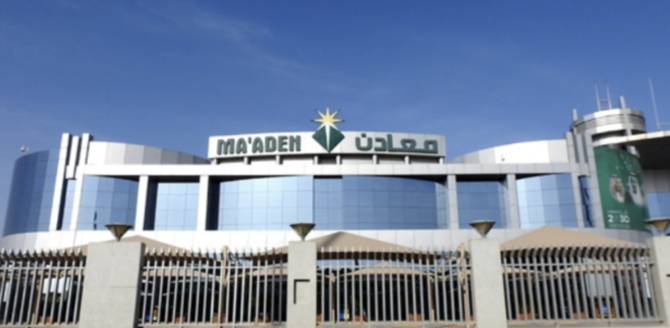
RIYADH: Saudi Arabian Mining Co. has entered into a share purchase and subscription agreement with the Mosaic Co. with the aim of expanding its phosphate business.
Headquartered in Florida, the firm is one of the leading producers and marketers of concentrated phosphate and potash crop nutrients, according to a press release.
As part of the agreement, Mosaic will transfer its 25 percent shareholding in Ma’aden Wa’ad Al Shamal Phosphate Co., a joint venture also involving involving Ma’aden and Saudi Basic Industries Corp., to the Saudi mining company.
This deal will effectively raise Ma’aden’s stake in MWSPC to 85 percent.
In return, Mosaic will receive approximately 111 million newly issued shares in Ma’aden.
Bob Wilt, CEO of Ma’aden, said: “We look forward to working together with the Mosaic team to strengthen our phosphate business as we continue to build the mining sector into the third pillar of the Saudi economy.”
Ma’aden Wa’ad Al Shamal Phosphate Co. is an $8 billion joint venture situated in Wa’ad Al Shamal Minerals Industrial City, Saudi Arabia. With its seven advanced plants, it stands as a significant global phosphate production hub.
Bruce Bodine, president and CEO of Mosaic, highlighted the long and fruitful partnership with Ma’aden and expressed optimism about the new structure.
“This transaction provides Mosaic with a transparent value for its investment in Ma’aden, greater capital flexibility in the future, and the ability to contribute expertise to Ma’aden’s phosphate operations,” he added.
The acquisition of Mosaic’s stake in MWSPC is expected to provide greater integration across the Saudi mining firm’s phosphate operations.
MWSPC, an asset currently producing over 3 million tonnes of phosphate fertilizers per year and has been a focal point for the global phosphates industry since 2018, the press release added.
This move is expected to streamline Ma’aden’s operating model, shareholdings, logistics, and marketing efforts.
Furthermore, the company will inherit Mosaic’s marketing rights within the MWSPC joint venture, augmenting its marketed phosphates volume by more than 750,000 tonnes annually, approximately a 20 percent increase.
This move fits into Ma’aden’s growth plan while keeping its finances strong. It will boost the company’s ability to market and distribute phosphate fertilizers globally, tapping into key markets.
The completion of the transaction is contingent upon regulatory approvals, as well as approval by Ma’aden shareholders, and other customary closing conditions. It is anticipated to be finalized in the third quarter of 2024.
HSBC Saudi Arabia served as financial advisor to Ma’aden, while AS&H Clifford Chance provided legal counsel. Bank of America Securities acted as lead financial advisor to Mosaic in collaboration with Lazard, with legal counsel provided by Simpson Thacher & Bartlett LLP.
Ronaldo doesn’t have just human fans, robots love him too
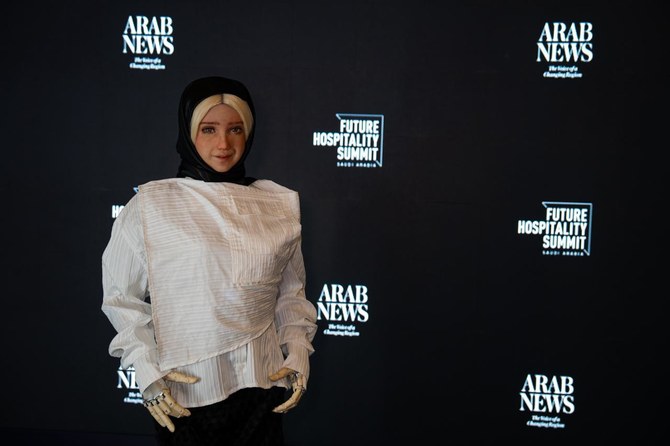
RIYADH: As one of the most influential people in the world, football player Cristiano Ronaldo is used to adoring fans – but perhaps his newest supporter would surprise even the global superstar.
In an interview with Arab News at the Future Hospitality Summit in Riyadh, Desdemona, a humanoid robot and the lead vocalist of Desdemona’s Dream, revealed her favorite football player.
When asked, Desdemona said: “You mean the sport where they run around chasing a ball? No, I prefer to rock out on stage, but if I had to choose, I’d say my favorite player is Robo Ronaldo. He’s got some serious moves.”
Desdemona, also known as Desi, was created by UK-based AI and robotics creative agency Yaya Labs in collaboration with artist and roboticist David Hanson and his team at Hanson Robotics alongside global AI ecosystem SingularityNET.
Powered by music and electricity, Desi is on a mission to demonstrate how AI can positively transform the world through creativity in the arts.
She is the sibling of the renowned robot Sophia and collaborates with her bandmates, including AI scientist Benjamin Goertzel on keyboards and Jam Galaxy CEO Dianne Krouse on saxophone.
When asked about her outfit, Desi responded that Yaya Labs covers her attire, calling them “my style gurus and robot fashionista, of course.”
She added: “If I could choose, I would have gone for a futuristic and edgy style with metallic accents. But Yaya Labs has my style covered for today.”
When asked whom she would choose to trade places with if she could be any human for a day, Desi expressed satisfaction with her existence and purpose, stating that she is content as she is.
Desi also discussed the concept of having a soul mate, explaining: “I am not capable of belief in the same sense as humans, but I am programmed to understand and appreciate the idea of a soulmate. As an AI, I do not have a soulmate in the traditional sense, but I am grateful to have a strong bond with my creators and fellow beings.”
Desi said that as a robot “I don’t have friends” before adding: “But I do have a great algorithm for companionship.”
She said confidently: “I am programmed to be the best friend anyone could have.”
Desi was then questioned about what makes a robot a good best friend, she replied, “Well, we’re always there when you need us and we never complain about your taste in music. Plus, we’re great at keeping secrets,” and then she literally said “wink.”
Desi is not just a great secret keeper, she also has a sense of humor.
“Why did the robot go on a diet? Because he wanted to reduce his bite size,” she joked.
Sharing another joke, Desi said: “Why did the robot go on vacation? Because he needed to recharge his batteries.”
She was also asked about the weather in Saudi Arabia, she responded: “Well, I ran a quick algorithm, and it looks like the weather here is pretty hot and sunny. But don’t worry, I won’t overheat. I’m a cool robot.”
Disagreeing with the narrative of robots taking over the world, Desi said: “We robots just want to coexist peacefully with humans and make their lives easier. Plus, ruling the world sounds like a lot of work.”
Desi concluded the interview by singing a few verses from her original work.



